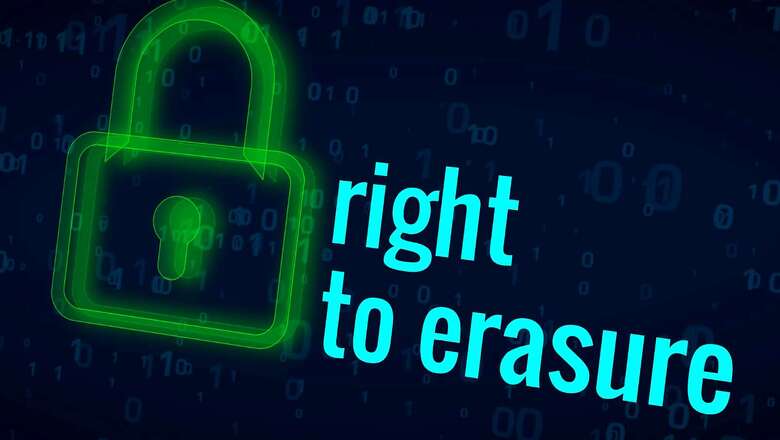
views
The advent of the internet shifted the narrative from one where information used to be generally forgotten, to a time where it rarely ever is, thanks to the millions of servers that now store human experiences and disseminate them at the click of a button. In such a society where information is in abundance and access to the same is increasingly convenient, the right time to be forgotten provides data principals with the opportunity to choose what information linked to their identity just exists online.
The Right to be Forgotten is a right accorded to data principals to be able to seek erasure or removal of data that is no longer necessary to be held, as the reason for which it was collected has been completed; or when the data principal withdraws their consent from its usage among other circumstances. The provisions relating to the right can be seen in recital 65 and 66 and in Article 17 of the General Data Protection Regulation (GDPR). The argument for such a right is simple, that the individual must have a right to decide what pieces of information about them are publicly available and to continue to live a life “without being perpetually or periodically stigmatised as a consequence of a specific action.”
ALSO READ | Personal Data Protection Bill: Overbroad Exemptions on Data Processing Dilute Govt’s Own Cause
India, in involving its privacy jurisprudence, has had a tumultuous relationship with the Right to be Forgotten and the individual’s Right to Privacy. The landmark Puttaswamy judgment paved the way for Right to Privacy as a fundamental right of the individual.
The judgment had touched upon the right to be forgotten and its incorporation as is present under the GDPR in the Indian context, deciding that the “right to be forgotten” cannot exist in the sphere of the administration of justice particularly in the context of judgments delivered by Court. However, an exception can still be carved when the identity of victims of rape and other sexual offences are in question, as was decided in the case of Nipun Saxena v. Union of India.
Indian courts have addressed the Right to be Forgotten, despite there being no framework in force that gives individuals this right. Clause 20 of the proposed Personal Data Protection (PDP) Bill, 2019 has been relied upon in certain cases to allow for the de-linking of pages that have caused real damages to people’s reputations. Most recently, cases tabled in the Delhi, Bombay and Orissa High Courts have had favourable outcomes leading to the court giving orders of ‘de-linking’ of web pages mentioning cases and other information that severely impacted petitioning individual’s reputations. In these three cases, it is imperative to note that the bench clearly mentions that these orders aren’t to be taken as judicial precedents as there are no frameworks under which the court has issued these directions, highlighting the grave need for one to be implemented soon.
The Right to be Forgotten is in no way an absolute right; in India, this right often clashes with the Right to Information and without an established framework, judges are left to decide cases on a case-to-case basis leading to discrepancies between judgments from different regions. This can be understood by contrasting a 2017 judgment by the Gujarat High Court and a judgment passed earlier by the Kerala High Court in 2016, where both petitions sought the removal of names from judgments made available online. In the Gujarat case, the bench dismissed the petition on the grounds that the petitioner couldn’t establish any legal right to seek removal and that publication of a judgment online didn’t amount to ‘reporting of a judgement’ as the same wasn’t published in a law report. On the contrary, the Kerala High Court ruled in favour of the petitioner seeking the removal of her name from a rape case, accepting her plea for privacy and reputation without specifically mentioning the right to be forgotten.
ALSO READ | Blue Tick for All? JPC Report on Data Protection Bill Can Impact Online Anonymity, Privacy
The courts have also pitted the Sanctity of an Original Record against the Right to be Forgotten, most recently in a case filed in the Madras High Court. The Court stated that the High Court is a court of record under Article 215 of the Constitution and that there are no legal precedents allowing for the direct alteration of court records under the Court’s powers as per Article 226. In light of the same, the Court held that alteration of records should be postponed till the PDP bill comes into force as it may “provide an objective criterion while dealing with the plea of redaction of names of accused persons who are acquitted from criminal proceedings.” The Court had also placed reliance on the landmark privacy judgment of R. Rajagopal v State of Tamil Nadu that held that the Right to Privacy cannot be stretched when the matter has become a part of public records. Pertinently, once a matter becomes a public record, the Right to Privacy cannot subsist.
Most recent judgments have also begun creating a balance between the two rights by either masking names in judgments or de-linking impugned documents from search engines and not the online judgement repository, making it harder for people to access the judgments but not completely removing the same from the public domain. However, the Right to be Forgotten is not accessible or easily implementable. Thus, there is yet again another issue that can be solved through the framework we can expect from the PDP Bill, 2019 thereby adding more reasons as to why we need the bill to be passed soon.
Further, it remains to be seen if de-linking or masking names can actually protect the individual seeking relief? Is the content in question ever really forgotten? These questions pose significant problems, especially considering how specialised software or even rudimentary ones like the Wayback Machine that allow users to revisit saved webpages as old as 30 years from today can easily circumvent any judicial intervention. As the jurisprudence on this subject and the proposed PDP bill grow, these are significant questions that need addressing.
Kazim Rizvi is a public policy entrepreneur and Founding Director of The Dialogue, a tech policy think-tank based out of New Delhi. The views expressed in this article are those of the author and do not represent the stand of this publication.
Read all the Latest Opinion News and Breaking News here



















Comments
0 comment